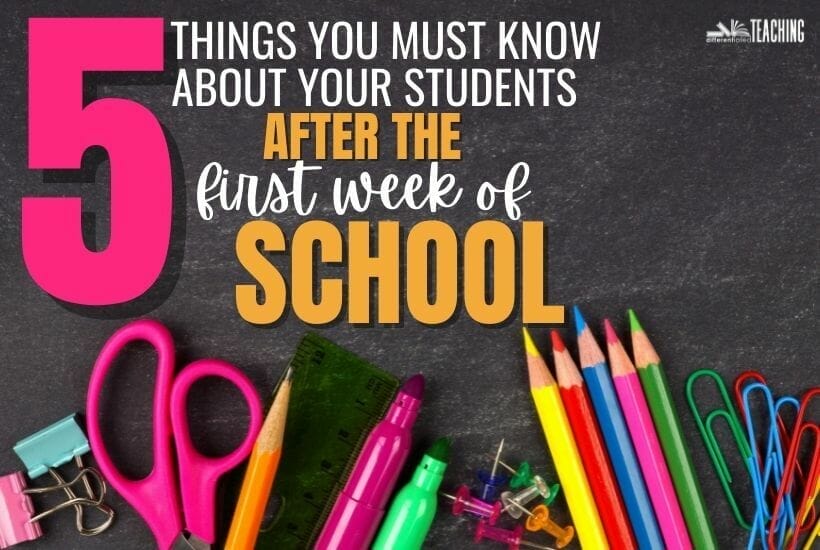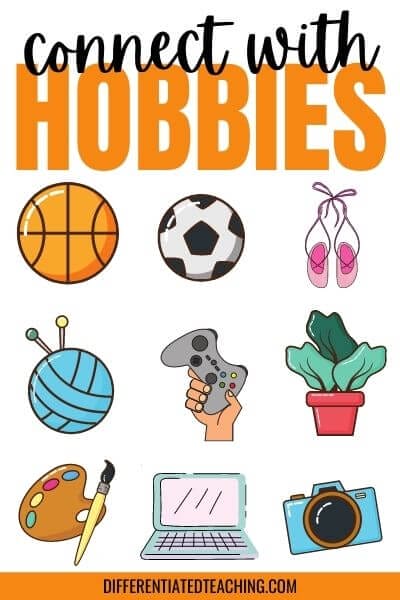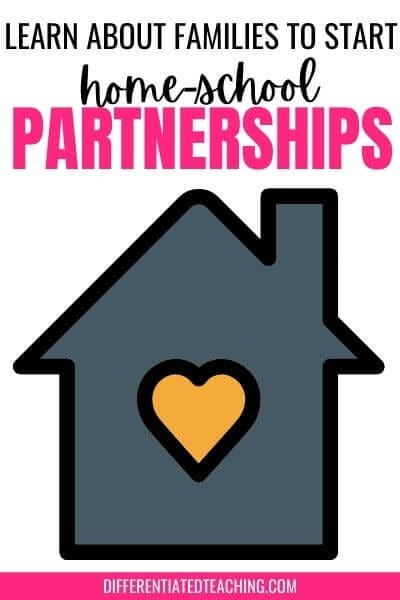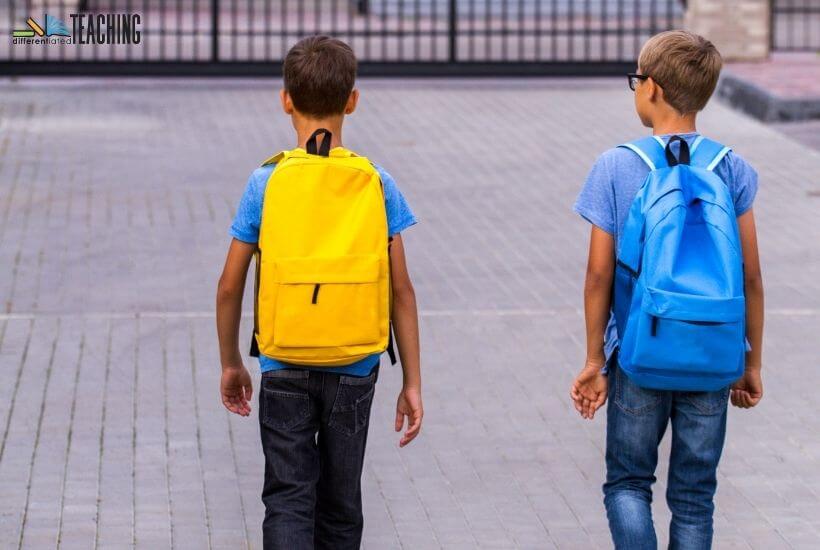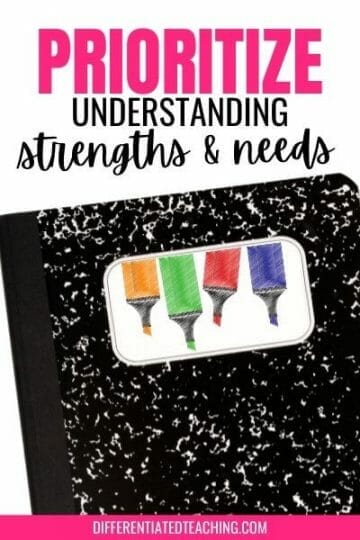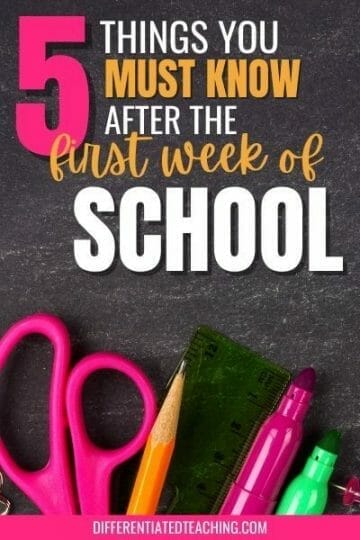5 Things You Must Know About Your Students After the First Week of School
Building relationships is an essential part of creating community in your classroom. Having strong relationships with your students has been shown to improve behavior, boost persistence, and improve academic outcomes for learners. When you first meet your class, you have the opportunity to make a great first impression, and building meaningful relationships with your students is easier if you know something about them.
Please note: This post contains Amazon affiliate links. Purchasing from these links does not cost you additional money, but I receive a small commission.
Getting to Know Your Students to Kick Off a Great School Year
Over the years, I have found that the first week of school really does set the tone for the entire school year, and there are several ways you can tell if you’re on the right track with building rapport in your classroom. Today I wanted to share 5 key pieces of information that you should know about your students by the time you wrap up with week one.
1. How to pronounce their name correctly.
While this might seem obvious, names are hugely important, and taking the time to learn how to correctly pronounce each student’s name is a really simple way to show that you see them and they matter. This is literally the bare minimum we can do as teachers to show our students that we respect them as people, and it also doesn’t take much time or energy to do! It’s step one when getting to know your students!
The Name Jar by Yangsook Choi is a great book to include in your back-to-school read-aloud selections, and it ties perfectly into the topic of names and their importance. In the story, the main character has just moved from Korea and is the new girl at school.
Like most new kids, she is worried about fitting in. She’s especially worried that no one will be able to say her name – Unhei. It’s a great book about finding the courage to be who you are, and it is a great reminder about how closely our names are to our personal identities.
If you’re someone who struggles with pronunciation (whether names specifically or just pronunciation in general), here are a few tips to make things easier:
- Let your students know how important it is to you to say their name right, and ask them to tell you how to say it.
- Write down the pronunciation phonetically to help you remember.
- Practice saying it often. Make it a point both when the student is present (so they can help correct you) and when you’re not with them.
- If you’re still not confident, don’t be afraid to ask the student if you’ve got it. Apologize and reiterate how much it matters to you to get it right if you’re still not quite right. Then keep working on it.
- If you’re teaching online, you can have students record an introduction video where they tell you their name and a little about themselves.
2. At least one interest or hobby your students have outside of school.
Getting to know your students means more than just finding out who they are as learners. One important way to do this is to find out more about things they like to do when they aren’t in your classroom. Whether it’s their favorite sport, TV show, or activity, it’s important to find ways to learn more about your students as people.
Why does it matter? Well, for a lot of reasons really!
First, knowing your student’s interests allows you to start a conversation with them about something besides their work. When a student comes in having a rough day, knowing that they love Minecraft can be a great way to start a conversation that will help bring them out of that funk. It can allow you to ask how the big game went when they arrive or wish them luck in their recital before they leave for the day.
And while these things may seem minor, they make a huge difference in the relationship you have with your students and their families.
Student interests and hobbies can also be majorly helpful when planning instruction, especially when you’re working with struggling or reluctant learners. Finding ways to connect the content with something that they’re already familiar with and LIKE can be a huge motivator even if the content itself may be more difficult.
They can also be a great starting place for something like a Genius Hour Project. Therefore, finding out hobbies and interests can help you both in the short-term and long-term.
As you’re considering ways to learn more about your students’ interests, here are a couple of ideas to consider:
- Use morning meetings to ask questions about hobbies or interests. For example, “What was your favorite thing about last weekend?” Or, “What do you like to watch on TV?”. These types of questions give you an opportunity to connect with your students while learning something interesting about them.
- Get input from parents. Most families are happy to share about their child, especially when it means that you’ll be able to better support their learning. If your school offers an open house the first week of school, ask parents to complete a short survey or write a letter sharing about their child.
- Observe! Look at their clothes, shoes, backpacks, etc. Students will often show off their interests through these items. Many times all it will take is a quick comment and they’ll be happy to tell you all about a favorite basketball player or author.
- Purposefully plan activities for the first week of school that will help you get to know more about your learners and their interests.
3. Who are your students’ friends & the basics of their peer relationships
When we walk into a classroom at the beginning of the year, most of us see and think about our students one at a time. As we get to know our students better through that first week, their prior relationships become more apparent.
It can be helpful for us to start seeing them as interconnected with the other members of their class or grade level. By understanding who their friends are, we get a better idea of what might be influencing them at any given time.

Why does it matter?
Understanding how your students are connected to each other can help you better support learning needs and behavior. If you notice a pattern in behavior or academic performance, talking with another student that might be influencing that child is a great way to gain insight into what might be going on under the surface.
If your students are old enough to be using social media, knowing that they are connected with other students might help you intervene directly with their behavior without causing them to feel like there are people gossiping about them.
At the most basic level, it can also help you consider how you might need to adjust the room arrangement or who might be a good person to connect a new student with when you’re hoping to help them make friends.
4. The big picture of the family situations in your classroom
Home-school relationships are critical. Understanding the basics of who the student lives with, including any siblings that may also be attending your school, can be a great way to foster that relationship with the student and their family.
We all know that it is important to know who the student lives with so we can understand who to contact and who to refer to when speaking with the child. However, the picture is bigger than that!
Here are a few things you should aim to know about your students and their families by the end of the first week:
- Who does the student live with? Is there a unique family situation you need to be aware of?
- Do they have any siblings or relatives that also attend (or work at) the school?
- Is there a special relative they spend lots of time with? A grandparent? Aunt/Uncle?
5. Your class’ overall strengths and needs academically
So this one may seem obvious, but one important piece of what you need to do is getting to know your students as learners. By the end of the first week of school, you should have a least a partial idea of your learners as…well…learners.
This means knowing what subject areas they enjoy and which they don’t like quite as much. It also means having some idea of which areas they may need some extra help vs. which they may need a little extra push to challenge themselves.
However, there are some less obvious things you should probably know, too. For example, you’ll want to have an idea of how they perceive themselves as a learner. Are they confident in their abilities or are they unsure and likely to need some extra praise?
Some of this will come from things you’ve learned before they even walk in the door if you’re teaching anything besides kinder.
However, there is a lot to be said about just taking time to observe your students as you start the basics during the first week of school. You can learn a lot about their study habits, approach to learning, and a general understanding of the basics just from these simple review tasks.
While you’ll likely be asked to complete assessments over the coming weeks, this first week can give you a great start in understanding your students.
Bringing it all together for a great school year
While none of this is rocket science, together these are important steps to getting to know your students. These things can also help you have an amazing school year. Not only do they show your students that you care about them, they also help you build home-school relationships that will foster learning all year long.
The first week of school can be exhausting, even for seasoned teachers. However, focusing on relationships is always well-spent time that will pay itself back in dividends across the coming school year.

